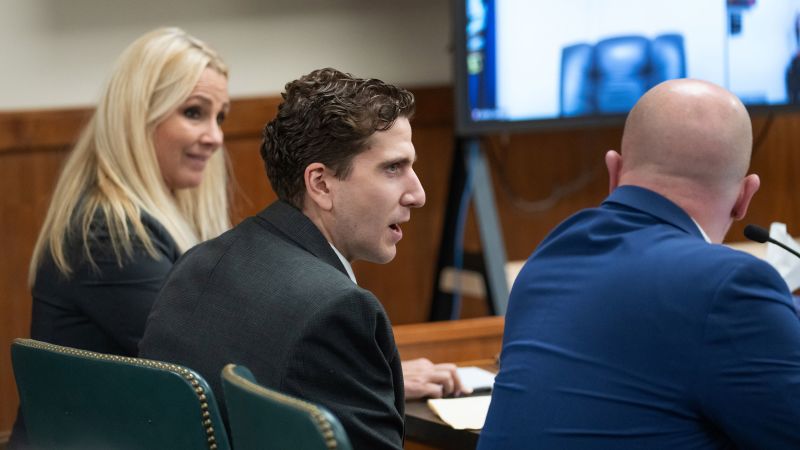Steve Goncalves was taken aback when he learned that prosecutors in Moscow, Idaho, had reached a plea deal with Bryan Kohberger, the man charged with the 2022 stabbing deaths of his daughter, Kaylee, and three other University of Idaho students. Just days earlier, Goncalves and other victims’ families had expressed their opposition to any plea agreement, urging prosecutors to pursue the death penalty in Kohberger’s upcoming trial.
“We don’t want to deal. We’re not interested in that. We didn’t wait two and a half years for this,” Goncalves stated, recounting his conversation with prosecutors. He left the discussion believing a plea deal was not a serious consideration, only to be blindsided by an email two days later confirming an agreement had been reached.
Plea Deal Details and Reactions
The plea deal, reportedly initiated by Kohberger’s attorneys, would allow him to plead guilty to all four counts of murder in exchange for the government dropping the death penalty. This development has left some victims’ families feeling excluded and frustrated.
Goncalves and his family have criticized the deal as “hurried” and “secretive,” arguing that prosecutors should have sought input from victims’ loved ones. Jeff Kernodle, Xana’s father, echoed these sentiments, describing the deal as a “missed opportunity” to set a precedent for accountability in such cases.
“It could have sent a message to others that these kinds of horrific crimes carry real consequences,” Kernodle said. “Instead, four beautiful lives were taken, and the person responsible won’t be used as an example to help prevent something like this from happening again.”
In contrast, families of the other two victims have expressed support for the plea deal. Ben Mogen, father of Madison, stated that acceptance of the plea would allow his family to avoid a trial and continue healing. Ethan’s mother, Stacy Chapin, also expressed support, planning to be in court to back the agreement.
Legal Process and Challenges
Despite the agreement, the plea deal is not finalized until approved by State District Judge Steven Hippler, who will oversee a hearing on Wednesday. Legal experts suggest the judge could require Kohberger to confess to details of the crime as part of the agreement.
Plea negotiations are typically confidential, and details of the discussions between prosecutors and Kohberger’s attorneys remain undisclosed. According to University of Idaho associate law professor Samuel Newton, plea deals often involve incentives like reduced sentences in exchange for guilty pleas. The potential time and cost of a death penalty case may have influenced both parties’ desire for a resolution.
“The family is looking at … decades of legal proceedings in a death penalty case, versus if he takes life without parole, it’s done and the family gets that degree of closure,” Newton explained.
Kohberger’s defense has faced several setbacks, including rulings that barred them from presenting an official alibi or an “alternate perpetrator” theory. These legal blows have limited their strategic options, potentially pushing them towards a plea deal.
Implications and Future Considerations
Goncalves and Kernodle have urged prosecutors to include provisions in the plea deal requiring Kohberger to disclose details of the crime, which could provide answers to lingering questions about the motive and execution of the stabbings. Goncalves hopes such disclosures would diminish support for Kohberger among those who maintain his innocence.
“We’re all going to live with the repercussions for the rest of our lives … unless Hippler steps in and says, ‘You’re not going to just say you’re guilty. You’re going to communicate some of the details so these families can actually move on,’” Goncalves emphasized.
There is a possibility Kohberger could maintain his innocence while accepting the plea deal by entering an Alford plea, allowing him to plead guilty without admitting guilt. However, Newton suggests this is unlikely, as prosecutors would likely require Kohberger to take responsibility for the killings.
The outcome of the plea deal remains uncertain until Judge Hippler’s decision. The case continues to highlight the complexities and emotional toll of legal proceedings in high-profile criminal cases, leaving families and the community to grapple with the implications of justice and closure.
About The Author
 Pentagon Halts Select Munitions Shipments to Ukraine Amid Review
Pentagon Halts Select Munitions Shipments to Ukraine Amid Review How to Watch the 2025 Queensland Reds vs British & Irish Lions Rugby Match Live
How to Watch the 2025 Queensland Reds vs British & Irish Lions Rugby Match Live Octopus Energy Offers Lifeline to Customers in Financial Distress
Octopus Energy Offers Lifeline to Customers in Financial Distress MAGACOIN FINANCE Joins Solana and Chainlink on Analyst Watchlists for Q4 2025
MAGACOIN FINANCE Joins Solana and Chainlink on Analyst Watchlists for Q4 2025 Philip Simmons High’s Iron Horses Aim for Continued Football Dominance
Philip Simmons High’s Iron Horses Aim for Continued Football Dominance